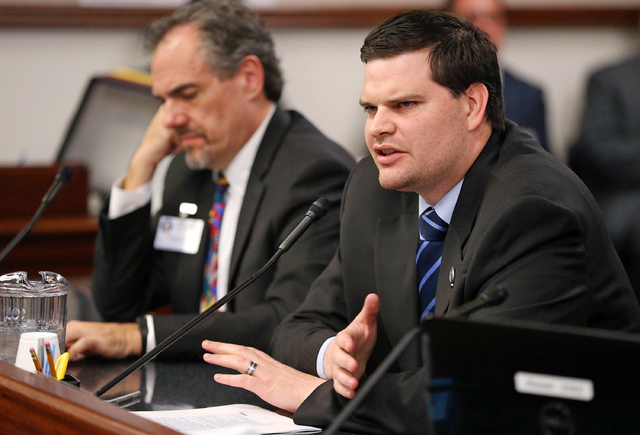State lawmakers to revisit empowerment model for CCSD school reform
State lawmakers, charged with reorganizing the Clark County School District, may recycle a school reform model that the Nevada Legislature abandoned during the economic crisis and state budget cuts.
By 2018-19, all 357 schools in the district will adopt a so-called “empowerment” model that grants more autonomy at the campus level, according to a final proposal that a nine-member legislative panel will consider Wednesday.
The brainchild of a longtime Canadian educator, empowerment schools offer principals greater control over their budget and curriculum, and encourage more communication with parents, students and staff.
In exchange, the schools are held to higher levels of accountability.
Empowerment schools are nothing new in Nevada: A decade ago, the district piloted a version of the program at four elementary schools and, with support from the Nevada Legislature, eventually expanded it to 30 campuses.
Implementation of the model, however, quietly ended after lawmakers withdrew funding, and private grants dried up.
“The empowerment school actually was successful,” said Assemblyman David Gardner, R-Las Vegas.
Last year, he authored Assembly Bill 394, which requires the reorganization of the district in order to boost student achievement, strengthen local control and cut costs.
Gardner would not comment on whether “empowering” every campus in the district actually could cost the state more money. But in the early trial, the district received about $5 million annually to spend an extra $400 per student in each empowerment school.
If the state mandated that model across the district, it would cost about $128 million to provide the same level of support for approximately 320,000 students.
Anchored in the idea that the adults most closely involved with children should make critical decisions affecting their instruction, an empowerment school devolves more power away from central administration. Each school gains autonomy over staffing, scheduling and teaching methods, with input from the community that attends and surrounds the campus.
Michael Strembitsky, former superintendent of Edmonton Public Schools in Canada, initiated the “school site decision-making” model at seven schools in 1976. He also worked as a consultant for the district as it implemented an empowerment program and in February briefed the legislative panel on the approach.
The proposal up for consideration Wednesday includes $150,000 for Strembitsky to consult on the development of the reorganization plan, with a September deadline to draft regulations for its implementation.
“I love Mike Strembitsky. He’s the father of decentralization,” Gardner said.
“The version (of empowerment) we had isn’t exactly what he wanted it to be,” he added. “He didn’t get the leeway he was trying to get. This will be the full-blown empowerment school (model) that we’ve seen drive achievement in other areas.”
If the reorganization committees endorses Strembitsky as its primary consultant, the Legislature’s interim finance committee must approve his employment at a separate meeting Thursday.
His work would include establishing recommendations to determine a new management structure that overhauls its “line of authority” and supports decision-making at individual schools. He also will focus on defining “precinct,” as AB 394 requires the creation of an unknown number of precincts, and researching how a reorganization will impact funding formulas, teacher salaries and tenure, parental and community engagement, and other issues.
“We look forward to hearing Mr. Strembitsky’s comments and his ideas for the work that he will be presenting on Wednesday,” the district said in an emailed statement.
Also Wednesday, the reorganization committee may tap the Guinn Center for Policy Priorities to provide research, writing and community outreach support at Strembitsky’s request.
Lawmakers face a Jan. 1 deadline to submit a final plan, and Strembitsky would help the Clark County Commission meet a requirement in AB 394 to present the plan at a minimum of six public meetings.
Contact Neal Morton at nmorton@reviewjournal.com or 702-383-0279. Find him on Twitter: @nealtmorton




























